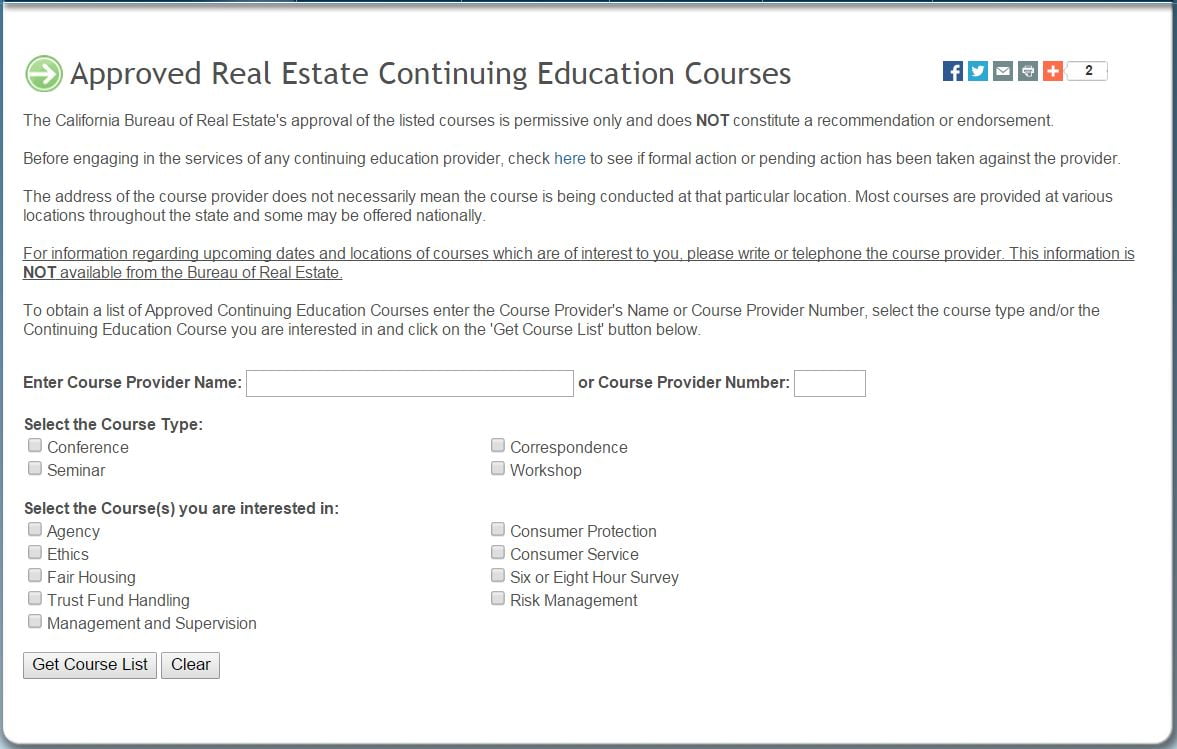How do you find and select your CalBRE continuing education provider?
- Past use (59%, 17 Votes)
- Internet search (21%, 6 Votes)
- Colleague referral (7%, 2 Votes)
- Mailed advertisements (7%, 2 Votes)
- Broker recommendation (3%, 1 Votes)
- E-mailed advertisements (3%, 1 Votes)
Total Voters: 29
Read on so you know how to select a reputable and compliant CalBRE continuing education provider.
The California Bureau of Real Estate (CalBRE) recently released an advisory informing licensees the continuing education provider, The Career Compass, is no longer permitted to offer CalBRE continuing education courses. [See CalBRE Licensee Advisory, August 6, 2015]
The Career Compass violated CalBRE regulations by issuing CalBRE continuing education course completion certificates to licensees without administering final exams – a CalBRE requirement strictly enforced for all course providers. [Calif. Bureau of Real Estate Regulations §§3006(d), 3007.3]
After Career Compass’ accreditation was revoked, it partnered with an approved, third-party course provider, Gold Coast Schools, and continued to violate CalBRE regulations by:
- falsely advertising its courses may be used for CalBRE continuing education credit;
- failing to disclose the course material it offered was approved for and provided by Gold Coast;
- administering exam questions that differed from questions approved for Gold Coast’s material and providing answers before administering the exam;
- claiming that reading the course material was optional, thus failing to ensure licensees devoted the CalBRE-mandated amount of time on reviewing the course material; and
- issuing course completion certificates that named Gold Coast as the provider but were unlawfully signed by a representative from The Career Compass.
The violations resulted in an order from CalBRE for both Career Compass and Gold Coast to cease any marketing that states or implies Career Compass is qualified to provide continuing education to licensees for CalBRE credit or that Career Compass is permitted to act as an instructor for continuing education courses. Gold Coast dropped its affiliation with Career Compass.
More importantly, licensees who took courses through The Career Compass had their continuing education courses rejected when attempting to renew with CalBRE.
Worse, a licensee who receives a course completion certificate without studying and successfully completing an exam or who falsifies information on their renewal application is also subject to disciplinary action by CalBRE. [CalBRE Bulletin, Winter 2014; Calif. Business and Professions Code §§10170.5(d), 10177(a)]
Thus, a licensee’s choice in selecting their continuing education course provider plays an important role in ensuring proper satisfaction of CalBRE renewal requirements.
Editor’s note — As a course provider, first tuesday is also subject to these CalBRE regulations and expects to be held to the same standard by licensees. We encourage licensees to select course providers carefully no matter which course provider they are considering.
Identifying valid course providers
Agents and brokers are required to complete 45 hours of continuing education every four years. To offer the required courses to real estate licensees, course providers first submit their course material to CalBRE for approval. Each approved course provider is issued a four-digit CalBRE continuing education sponsor number identifying them as an approved real estate educator.
Licensees need to look for this sponsor number on advertisements for continuing education courses and provider websites. The absence of the four-digit sponsor number is an indication the course provider is not compliant with CalBRE regulations and likely not authorized to provide courses for CalBRE continuing education credit. [CalBRE Regs. §3007.6(a)(3)]
Upon approval, course providers are subject to well-defined course administration guidelines. This includes ensuring licensees understand the course provider’s policies and continuing education requirements by providing a General Information page prior to enrollment. [CalBRE Regs. §3007(f)]
Licensees are advised to look for this page before enrolling in a course online, as failure to provide this page on the course provider’s website is a violation of CalBRE regulations.
Confirming approved course providers
Want to ensure a course provider is approved by CalBRE before signing up? CalBRE provides real estate licensees a reliable way to search for approved course providers and continuing education on their website. [See CalBRE: Approved Real Estate Education Courses]
The online continuing education search doubles as a way for licensees to both confirm a course provider has CalBRE approval to offer courses and to find approved courses for renewal with topics best suited to the licensee.
To confirm a course provider’s CalBRE approval, licensees may enter a course provider’s name or sponsor number in the search fields. This generates a full list of course offerings approved by CalBRE for that provider.
To search for approved continuing education courses, licensees may tick the check boxes for the types of courses they are seeking. The system will produce a full list of courses from all providers that meet the selected criteria.
Course materials and study time
Upon enrollment, the content and format of a continuing education course are regulated by CalBRE.
When offering a live course, a continuing education course provider needs to ensure licensees are present for at least 90% of the offering time, in addition to the time it takes to complete exams. [CalBRE Regs. §3006(b)]
A correspondence course requires course providers to supply licensees with enough course material to adequately cover 45 hours of education. Also, they are to ensure that licensees devote the required number of hours to reviewing material. [CalBRE Regs. §3006(g)]
Thus, a continuing education course that only provides online material needs to clock a licensee’s study time and reading to ensure they actually complete 45 hours of online education. When books are provided and reading cannot be timed, the course provider still needs to prevent licensees from completing the course sooner than the amount of time CalBRE deems sufficient for the licensee to first review the material and complete quizzes before testing. [CalBRE Regs. §§3006(g), 3007.3(j)]
Noncompliant course providers attempt to bypass these regulations by allowing licensees to review online material without logging in the reading time, or permitting completion of the course before the licensee satisfies all 45 hours, including quizzes. These are some of the violations of CalBRE regulations and are grounds for:
- withdrawal of the course provider’s continuing education approval; and
- denial of a licensee’s renewal application.
Quiz and examination rules
Course providers are required to give licensees incremental assessments, i.e. quizzes, throughout the course to test the licensee’s grasp of the material. Quizzes are mandatory for all licensees. [CalBRE Regs. §3006(p)]
Licensees are then required to pass final exams to receive a valid course certificate. Course providers are only permitted to duplicate up to 10% of the questions used on the quizzes for the exams. Thus, the majority of questions on the exams are mandated to be different from the questions licensees encounter on the quizzes. [CalBRE Regs. §3007.3(l)]
CalBRE imposes stringent guidelines on continuing education course providers to ensure exams:
- are properly timed – no more than one minute per question [CalBRE Regs. §3007.3(f)];
- require a passing score of 70% or more [CalBRE Regs. §3007.3(o)];
- allow a licensee two attempts to pass with two versions of the exam and, when both are failed, require licensees to complete the course hours again [CalBRE Regs. §3007.3(k)];
- only permit a licensee to test on a maximum of fifteen hours of material in a 24-hour period [CalBRE Regs. §3007.3(c)];
- contain a state-mandated minimum number of questions, depending on the number of hours in the course [CalBRE Regs. §3007.3(d)];
- are protected to maintain the integrity of the exams by prohibiting licensees from downloading or printing the exams and automatically timing out after the maximum amount of time has lapsed [CalBRE Regs. §3007(i)]; and
- when administered by a proctor on paper, are monitored by someone who is not related to the licensee by blood, marriage, domestic partnership or other relationship (including work-related) that may influence them to deviate from proper exam administration rules, which the proctor is to certify in writing. [CalBRE Regs. §3007.3(h)]
Thus, licensees need to be aware of any course provider that fails to follow these guidelines by, for example, not administering exams or not timing the licensee’s exams.
Further, licensees who request an exam proctor for paper exams also assume an obligation to conform to CalBRE regulations by only providing a proctor who is not related to them and ensuring their proctor confirms compliance in writing.
Noncompliant course providers
When any continuing education course provider violates the regulations controlling the content of the course or exam administration, CalBRE may revoke the provider’s approval. The withdrawal is effective 30 days after a course provider receives notice of CalBRE’s withdrawal. Thereafter, real estate licensees may no longer submit to CalBRE any courses from that provider completed on or after the effective date of the withdrawal to renew a license. [CalBRE Regs. §3010]
Real estate agents and brokers need to carefully select continuing education course providers and confirm they are approved by CalBRE before enrollment. Course providers who do not properly follow CalBRE regulations put real estate licensees at risk and impact their ability to renew on time with valid continuing education.
Agents and brokers who come across continuing education courses that violate CalBRE regulations may report the course provider by filing a complaint with CalBRE, submitted along with supporting documents. [See CalBRE Form 340: Education Provider Complaint]
CalBRE will investigate the course provider’s continuing education and activities, and later conduct a disciplinary hearing if they discover any violations.
Have you encountered noncompliant and disreputable continuing education course providers? Has your renewal ever been compromised by a course provider that violated CalBRE regulations? Let us know in the comments.




















This article is LITERALLY full of complete misinformation to the point of almost lying. If you REALLY want to know exactly the truth about Career Compass and all of its dealings with Cal DRE, feel free to pick up the phone and call us at 619-840-9355, since you failed to do that before even writing this article.